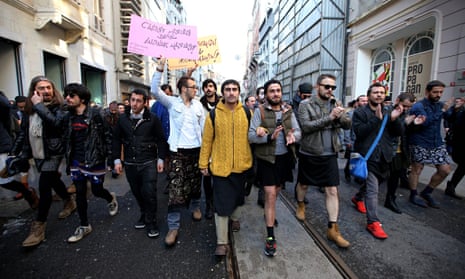Özgecan Aslan was a 20-year-old psychology student with dreams, fears and aspirations who was tortured and murdered by a man. She could have become just another statistic in a global pandemic of male violence against women, but in Turkey and neighbouring Azerbaijan she has become an icon.
Across Twitter, Turkish women have responded by sharing their experiences of harassment, objectification and abuse. But something else happened: men took to the streets wearing miniskirts, protesting at male violence against women and at those who excuse it or play it down.
Before assessing how men can best speak out in support of women, it’s worth looking at the scale of gender oppression. The statistics reveal what looks like a campaign of terror. According to the World Health Organisation, over a third of women globally have suffered violence from a partner or sexual violence from another man. The UN estimates that about 133 million girls and women have suffered female genital mutilation, and believes that nearly all of the 4.5 million people “forced into sexual exploitation” are girls and women. In Britain, about 1.2 million women suffer domestic violence a year, 400,000 are sexually assaulted, and 85,000 are raped: again, misery inflicted by men against women on a mass scale.
And then there’s the economic side of it. The International Monetary Fund’s Christine Lagarde describes “an insidious conspiracy” against women through laws, varying in scale across the world, that prevent women from working. Women are disproportionately concentrated in the lowest paid, most insecure and often most demeaning forms of work; they also do the vast majority of unpaid housework and childcare. The oppression of women is comprehensive indeed.
But how do men speak out about a form of oppression from which they benefit? Take this column. It is inherently problematic. There is no shortage of men offering their opinions on, well, everything. It is mostly men representing the nation and passing laws: about 80% of MPs are men. A study in 2012 found that male journalists were behind 78% of all front page articles, and 84% of those mentioned or quoted in lead pieces were men. The national debate is shaped by men; issues are prioritised by men and the prism through which they are analysed is decided by men. What a farce it would be if men began to dominate the debate about men’s oppression of women.
Indeed, there can be a perverse irony involved in men speaking out in support of women. As the US sociologist Kris Macomber has put it, men are “members of the dominant group; they have access to social and institutional power that women lack”. In other words, their support for feminism is useful for the very thing feminism is struggling against – their power. Feminists have often expressed their frustration to me that men are applauded for saying what women have said for generations.
And then there are the men who elect themselves “feminists” as a way of granting themselves a certain type of coolness, or making themselves more attractive to women: “Look how sensitive and caring I am – I’m even a feminist!” Sexism is rife on the left – as it is everywhere in society – but the danger is that leftwing men may decide they cannot possibly be sexist, even as they interrupt a woman to assert their feminism. One leftwing feminist tells me she can work out a man’s attitude to women in five minutes: “Do they interrupt you? Do they listen to you? Do they presume they know more than you?”
So what is the role of men in all this? The liberation of women is down to women, after all, and the great advances that have so far been made are down to the struggle and sacrifice of women: some known, some airbrushed from the history books. The women’s movement has changed men for the better: they are more likely to have female and gay friends than they once did, to talk about their feelings (though not enough), to have a greater role in raising children, and so on. Men are so accustomed to various privileges – such as automatically being taken more seriously – that they are not even aware they exist. That’s why it is so crucial that men listen to women and their experiences, and learn.
Yet men will only stop killing, raping, injuring and oppressing women if they change. That means tackling attitudes within their ranks that make possible the objectification of women, for instance, or which normalise violence against women. The White Ribbon Campaign is one example, attempting to transform men’s attitudes towards such violence. Unless men speak out, such attitudes will persist and the terror against women will continue.
And while men are not oppressed by men’s oppression of women, some are certainly damaged by it. Gay men are a striking example: we are deemed to be too much like women. But some straight men suffer because of an aggressive form of masculinity too. The boundaries of how a man is supposed to behave are aggressively policed by both sexism and its cousin, homophobia. Men who do not conform to this stereotype – by talking about their feelings, failing to objectify women, not punching other men enough – risk being abused as unmanly. “Stop being such a woman,” or “Stop being such a poof.” Not only does that leave many men struggling with mental distress, unable to talk about their feelings; it also is one major reason that suicide is the biggest killer of men under 50. This is one of the key arguments made by the HeForShe campaign championed by Emma Watson, which attempts to encourage men to support women.
So, yes: this column is problematic. I’m yet another of the men who dominate the opinion pages of newspapers. Women’s voices are not heard enough. And when they are heard, they are taken less seriously than men.
We have to be humble: to listen and to learn. But unless men speak out, the pandemic of violence against women will continue.

